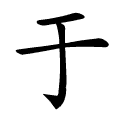于 yú in; at; to
Made up of [丁 dīng nail; robust; adult man ]Made with 3 strokes.
Ancient seal mark of a tool of some kind
Ancient small seal form 

Related characters
Also uses 丁 dīng component: 灯 dēng (lamp) 宁 nìng (better) ; 打 qiú (to beat) ; 行 xíng (permitted)
Sounds same
鱼 yú (fish) ; 渔 yú (fishing)Different tone
雨 yǔ (rain) ; 语 yǔ (language) ; 与 yǔ (to give) ; 玉 yù (jade) ; 豫 yù ; 王 yù (jade) ; 遇 yù (to meet) ; 欲 yù (to wish for)Pronunciation
Sound file kindly provided by shtooka.net ➚ under a Creative Commons Attribution Share Alike License

Stroke order for character 于, kindly provided under Wikimedia creative commons license ➚
Proverbs
嫁祸于人 jià huò yú rén Spread blame onto others千里之堤,溃于蚁穴 qiān lǐ zhī dī, kuì yú yǐ xué Take full attention to detail to avoid catastrophe
千里之行始于足下 qiān lǐ zhī xíng shǐ yú zú xià Perseverance will lead to eventual success
青出于蓝而胜于蓝 qīng chū yú lán ér shèng yú lán Wise schooling has produced excellence beyond the teacher. The student has surpassed the master.
事实胜于雄辩 shì shí shèng yú xióng biàn Better to act than just talk about it
苛政猛于虎 kē zhèng měng yú hǔ The story is that Confucius met a woman near mount Taishan who was weeping bitterly. When asked, she said she had lost father-in-law, husband and son to marauding tigers. Confucius asked why she did not move to a safer village; she replied that she was sheltering from a despotic government and would rather risk tigers than oppression. Tyrannical government is the worst of evils.